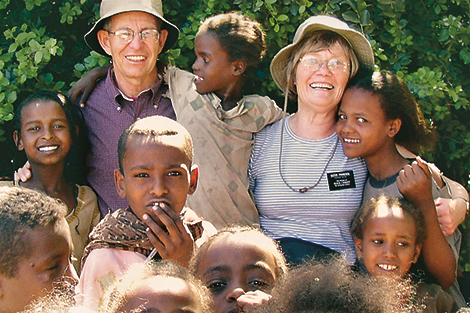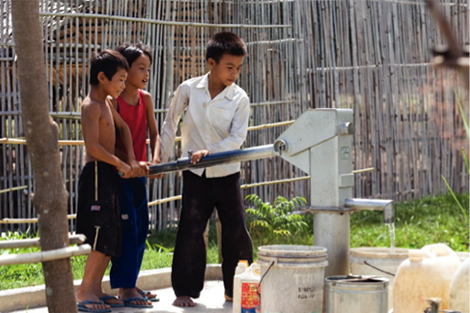
If you've just been called to perform or oversee humanitarian work, read the following information to familiarize yourself with the purpose and activities of Church Humanitarian Services
Guiding Purpose
The primary purpose of Humanitarian Services is to relieve suffering, to foster self-reliance for families of all nationalities and religions, and to provide opportunities for service. A secondary purpose of Humanitarian Services is to help bring the Church out of obscurity.
All Church humanitarian activities are made possible by generous donations of money, goods, and time from Church members and others. All donations to the Church Humanitarian Aid Fund go directly to support approved relief and development projects throughout the world.
Activities
The activities of Humanitarian Services include:
- Emergency response following disasters
- Major initiatives
- Clean water
- Wheelchairs
- Maternal and Newborn Care
- Vision
- Food production
- Community Projects, which are modest projects targeted to local needs
Key Principles of Humanitarian Work

The principles and doctrines that govern Church welfare also guide Church humanitarian activities. Some key principles include:
Self-reliance is strengthened when people learn to use their own resources and see themselves as achieving results with their own efforts. There is then a sense of self-esteem and dignity that is self-perpetuating. In addition to faith in God, people need the faith that work will make a difference and that cooperation with others is not only possible, but essential.
“Many programs have been set up by well-meaning individuals to aid those in need. However, many of these programs are designed with the short-sighted objective of ‘helping people,’ as opposed to ‘helping people help themselves’” (Marion G. Romney, in Ensign, Nov. 1982, 91).
Work and participation by recipients is essential for project sustainability and promoting self-reliance. As those assisted plan and do, they gain confidence and establish patterns for future success. They become more self-reliant and prepared to serve others.
A champion in the organization is critical to achieving results. This individual should be creative, committed, and honest and should have already achieved clear results in previous projects.
Sustainability ensures that project outcomes will continue by communities after project support from the Church has ended. Some keys to sustainability include:
- Limited Scope: Within the community’s capacity.
- Appropriate Technology: Use of locally-available methods, skills and materials.
- Local Institutions: Strengthens local people and institutions so they can build on success.
Help to all in need
“In contrast to welfare assistance, Church humanitarian aid is intended primarily for those who are not members of [the Church]. It is distributed without any strings attached. To avoid any risk that humanitarian aid might be misunderstood as a subtle inducement for recipients to join the Church, humanitarian aid is not distributed by bishops or other local leaders, by proselyting missionaries, or through the Church’s missionary organization. The Church does not seek ‘rice Christians.’ Humanitarian assistance is a loving gift to help those in need without regard to their religious beliefs or interest in Mormonism. It is separately administered by professional workers and by specially called humanitarian missionaries” (Dallin H. Oaks, Deseret News, 11 Nov. 2006).
Roles and Responsibilities
Senior Welfare Missionaries
Senior welfare missionaries have many responsibilities that may include Church humanitarian work. They receive their day-to-day direction from the director for temporal affairs and the area welfare manager. Their ecclesiastical leader is either a mission president or the Area President.
Senior welfare missionaries may have the following duties:
- Provide shadow leadership to branch and district leaders, as assigned
- Help local Church leaders as they help members with welfare challenges including employment
- Help train local Church leaders in their welfare responsibilities
- Serve as project managers for humanitarian projects
Project Manager
A humanitarian project manager is defined as the person or couple assigned to a Church humanitarian project. Most often, the project manager will be an assigned missionary couple in a country. A member in the country or a short-term specialist may be assigned as project manager.
Project managers--
- Identify potential partners, contractors, collaborating organizations, and government agencies.
- Complete assigned steps in the approved project process.
Specialists
Specialists are senior service missionaries. They help area welfare managers and project managers develop and implement major initiative projects. Most major initiatives will require a specialist to assist in developing and carrying out the project because of their technical nature and complexity. Specialists may help through telephone and e-mail contacts, and with on-site support when needed.
Specialists--
- Serve at the request of headquarters and area welfare managers.
- Support the project manager on project development, implementation and follow-up.
- Complete assigned steps in the approved project process.
Area Office
Area Presidencies provide leadership for Church humanitarian activities in the area. They are assisted by the director for temporal affairs and the area welfare manager. In some areas, area welfare specialists help senior welfare missionaries as they develop and implement humanitarian projects.
Church humanitarian work is guided by an annual plan approved by the General Welfare Committee. The plan is based on requests from Area Presidencies and directors for temporal affairs.
The annual plan lists the major initiatives by country with planned beneficiaries and expected costs. The annual plan includes a budget for area initiative projects. Emergency response projects are not included in the plan. The plan is prepared by the area welfare manager using the Church Humanitarian System (CHaS).